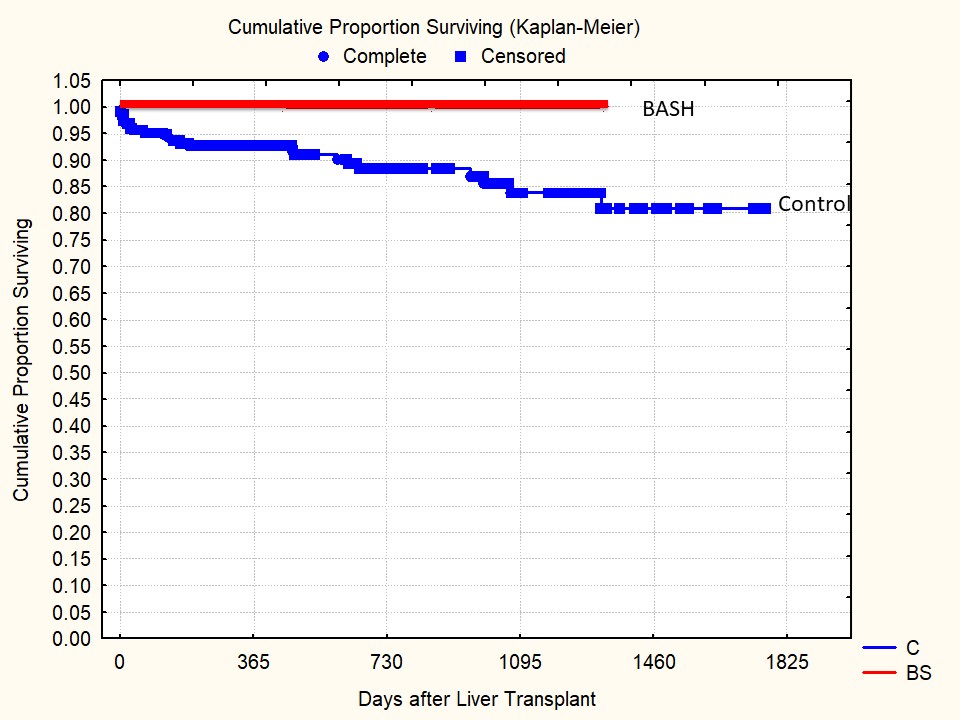Bariatric Surgery and Alcohol Related Steatohepatitis (BASH): An Increasing Etiology in Pre-Liver Transplant Candidates
1Surgery, Westchester Medical Center/ New York Medical College, Valhalla, NY, 2Medicine, Westchester Medical Center/ New York Medical College, Valhalla, NY, 3Anesthesia, Westchester Medical Center/ New York Medical College, Valhalla, NY
Meeting: 2022 American Transplant Congress
Abstract number: 1435
Keywords: Alcohol, Liver cirrhosis, Liver transplantation, Obesity
Topic: Clinical Science » Liver » 53 - Liver: Cirrhosis - Portal Hypertension and Other Complications
Session Information
Session Name: Liver: Cirrhosis - Portal Hypertension and Other Complications
Session Type: Poster Abstract
Date: Monday, June 6, 2022
Session Time: 7:00pm-8:00pm
 Presentation Time: 7:00pm-8:00pm
Presentation Time: 7:00pm-8:00pm
Location: Hynes Halls C & D
*Purpose: Obesity-related fatty liver disease and non-alcoholic steatohepatitis (NASH) are common causes of End-stage liver disease (ESLD). Bariatric surgery (BS) is commonly indicated for these patients, which may lead to weight loss and improvement in NASH. After bariatric surgery, these patients are at higher risk of progression of liver disease, driven by alcohol misuse, altered pharmacokinetic in alcohol metabolism and higher body weight. We describe our experience of an increasingly identified etiology of prior BS and Alcohol related Steatohepatitis (BASH).
*Methods: Incidence of BASH and clinical characteristics were identified among post-LT (group1) and pre-LT (group2) among patients who were listed for liver transplant on our center from Jan 2017 to Nov 2021. Non-parametric data were analyzed by Chi-square test. Survival estimates were generated by Kaplan-Meier methods and compared with Log-rank test.
*Results: During the study period, 332 adult patients were listed for liver transplant. Of 332, 243 patients have undergone a successful liver transplant (group1). Of 243, 3 patients (1.2%) had prior BS. Primary diagnosis of ESLD of all 3 patients was alcohol related liver disease. Remaining 89 patients are currently listed at UNOS waitlist (group2). Of 89, 5 patients (5.7%) had prior BS. Primary diagnosis of all 5 of these patients is alcohol related liver disease. Incidence of BASH is higher in females (4.7%) vs males (1%) (P< 0.05). Incidence of BASH is statistically higher in patients awaiting liver transplant (P<0.05). Among post-transplant patients, overall patient survival at 1 and 3 years among non-BS patients (n=238) were 93% and 84% and among BS patients(n=3) were 100% and 100% respectively (P=NS).
*Conclusions: Alcohol misuse and obesity are on the rise in United States. Patients with prior BS are particularly at higher risk of progressive alcohol-related liver disease. Consequently, BASH is increasingly being identified among pre-liver transplant candidates, with higher incidence among female patients. Post-transplant, patient survival showed no difference between BASH and non-BASH patients.
To cite this abstract in AMA style:
Nishida S, Okumura K, Dhand A, Bodin R, Yaghoubian S, Greenberg C, Misawa R, Veillette G, Sogawa H, John D, Wolf DC, Partiula B, Diflo T, Latifi R, Lansman S. Bariatric Surgery and Alcohol Related Steatohepatitis (BASH): An Increasing Etiology in Pre-Liver Transplant Candidates [abstract]. Am J Transplant. 2022; 22 (suppl 3). https://atcmeetingabstracts.com/abstract/bariatric-surgery-and-alcohol-related-steatohepatitis-bash-an-increasing-etiology-in-pre-liver-transplant-candidates/. Accessed March 1, 2026.« Back to 2022 American Transplant Congress

